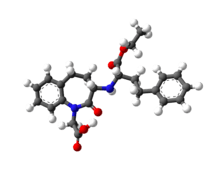Benazepril
 | |
 | |
| Clinical data | |
|---|---|
| Trade names | Lotensin |
| AHFS/Drugs.com | Monograph |
| MedlinePlus | a692011 |
| Pregnancy category |
|
| Routes of administration | Oral |
| ATC code | C09AA07 (WHO) |
| Legal status | |
| Legal status |
|
| Pharmacokinetic data | |
| Protein binding | 96.7% |
| Metabolism | Hepatic glucuronidation |
| Biological half-life | 10-11 hours |
| Excretion | Renal and biliary |
| Identifiers | |
| |
| CAS Number |
86541-75-5 |
| PubChem (CID) | 5362124 |
| IUPHAR/BPS | 6374 |
| DrugBank |
DB00542 |
| ChemSpider |
4514935 |
| UNII |
UDM7Q7QWP8 |
| ChEBI |
CHEBI:3011 |
| ChEMBL |
CHEMBL838 |
| Chemical and physical data | |
| Formula | C24H28N2O5 |
| Molar mass | 424.49 g/mol |
| 3D model (Jmol) | Interactive image |
| |
| |
| (verify) | |
Benazepril, brand name Lotensin (Novartis), is an ACE inhibitor used primarily in treatment of hypertension, congestive heart failure, and heart attacks, and also in preventing the renal and retinal complications of diabetes.
ACE inhibitors relax blood vessels, and decrease blood volume, which lowers blood pressure and decreases oxygen demand from the heart. They inhibit angiotensin-converting enzyme, which is part of the renin–angiotensin–aldosterone system.
Benazepril is a prodrug which is metabolized by the liver into its active form benazeprilat via cleavage of the drug's ester group.

Medical uses
Kidney disease
Patients with advanced renal insufficiency taking benazepril show "substantial" kidney benefits.[1] A long-term study of patients' kidney disease revealed patients who took benazepril had better kidney function and slower progressions of kidney disease than their peers who took a placebo drug.[2] This is notable because this category of pharmaceuticals has long been thought to cause further kidney damage or increase the rate of progression for kidney disease.
According to coverage of the study on WebMD: "ACE inhibitors can pose a potential threat to kidneys, as well. The key question was whether damaged kidneys would worsen if patients took ACE inhibitors. In a nutshell, concerns centered on blood levels of potassium and creatinine, waste products that are excreted by the kidneys. Testing creatinine levels in the blood is used as a way to monitor kidney function (...) kidney problems worsened more slowly in those taking Lotensin. Overall, there were no major differences in side effects between patients taking Lotensin or the placebo.[2]" This study marks the first indication that benazepril, and perhaps other ACE inhibitors, may actually be beneficial in the treatment of hypertension in patients with kidney disease.
Side effects
The most common side effects patients experience are a headache or a chronic cough. The chronic cough develops in about 20% of patients treated,[3] and those patients that experience it find it develops after a few months of use. Anaphylaxis, angioedema, and elevation of potassium levels are more serious side effects that can also occur.
Contraindications
Benazepril should be discontinued during pregnancy, as it can harm the fetus.
Dosage forms
It is also available in combination with hydrochlorothiazide, under the trade name Lotensin HCT', and with amlodipine (trade name Lotrel).
Veterinary use
Under the brand names Fortekor (Novartis) and VetACE (Jurox Animal Health), benazepril hydrochloride is used to treat congestive heart failure in dogs[4][5] and chronic renal failure in dogs and cats.
References
- ↑ Hou F, Zhang X, Zhang G, Xie D, Chen P, Zhang W, Jiang J, Liang M, Wang G, Liu Z, Geng R (2006). "Efficacy and safety of benazepril for advanced chronic renal insufficiency". N Engl J Med. 354 (2): 131–40. doi:10.1056/NEJMoa053107. PMID 16407508.
- 1 2 Hitti, Miranda; Chang, Louise (January 11, 2006). "Drug May Treat Advanced Kidney Disease". WebMD. Retrieved 2006-09-07.
- ↑ Dykewicz, Mark S. (April 2004). "Cough and Angioedema From Angiotensin-Converting Enzyme Inhibitors: New Insights Into Mechanisms and Management". Medscape. Retrieved 2 April 2014.
- ↑ King JN, Mauron C, Kaiser G (December 1995). "Pharmacokinetics of the active metabolite of benazepril, benazeprilat, and inhibition of plasma angiotensin-converting enzyme activity after single and repeated administrations to dogs". Am. J. Vet. Res. 56 (12): 1620–8. PMID 8599524.
- ↑ O'Grady MR, O'Sullivan ML, Minors SL, Horne R (2009). "Efficacy of benazepril hydrochloride to delay the progression of occult dilated cardiomyopathy in Doberman Pinschers". J. Vet. Intern. Med. 23 (5): 977–83. doi:10.1111/j.1939-1676.2009.0346.x. PMID 19572914.